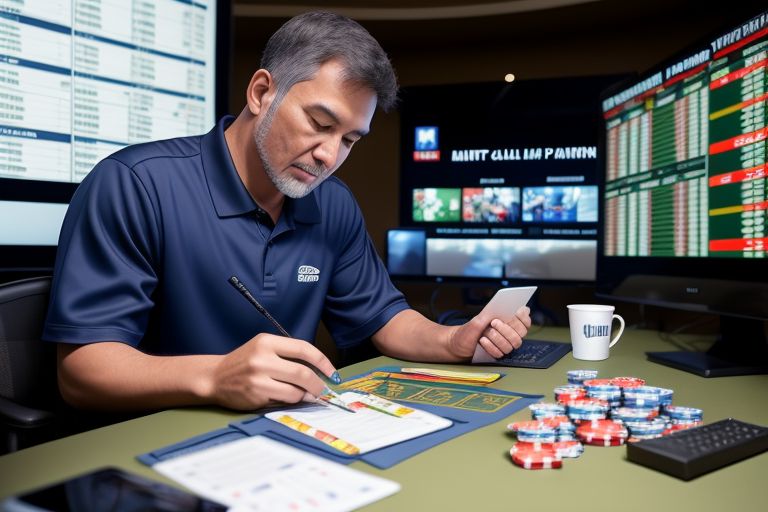Jan 14, 2025
How to Turn Your Betting Hobby into a Profitable Side Hustle with Valuebets



The idea of turning a casual betting pastime into a steady source of extra funds has drawn much attention in recent years. Enthusiasts worldwide are discovering that a well-informed approach—complete with data analytics, refined strategies, and prudent bankroll management—can elevate their sports betting experience from a playful indulgence to a genuine financial opportunity. Some achieve their goals through discipline and consistency. Others fail, often by underestimating the dedication required to foster real gains over the long term.
Sports wagering can evolve beyond entertainment for those willing to adopt a structured plan. This transition requires a deliberate mindset, risk-awareness, and a willingness to adjust to fluctuating markets. By harnessing a Betting Side Hustle approach, you can explore how methodical research and the principle of positive expected value might grant a lasting edge.
The Potential of Turning Betting into Sustainable Income

Betting culture was once dominated by spontaneity. People placed wagers based on hunches, casual chatter, or sheer excitement for the sporting event. Now, bettors can access advanced calculations, historical data, and comprehensive tutorials to guide their choices. These resources help carve out structured pathways to profitability.
Yet, you should recognize that success in sports betting is never just about luck. External factors - such as legal regulations, emotional control, and your personal risk appetite all significantly shape your outcomes. Being prepared means more than picking winners; it means meticulously refining a sustainable process.
High hopes can supercharge your motivation, but unrealistic expectations often lead to impulsive decisions. Short winning streaks may embolden you, while losses can unravel your years of discipline. Achieving modest yet consistent gains demands tenacity, ongoing education, and the ability to weather statistical downturns.
Remember: establishing a second income stream from betting is not necessarily a quick or simple feat. The learning curve can be steep, and your potential margin for error is considerable. Nonetheless, transforming your hobby into a legitimate side hustle is feasible with persistence and a willingness to adapt.
The Core Principle of “Value” in Valuebets
If you want your wagers to yield dividends over time, it is essential to base them on probabilities rather than intuition alone. In sports betting, you look for lines or odds that incorrectly capture the event’s true likelihood. When you find such a mismatch, you are dealing with Valuebets.
Expected value (EV) represents the average monetary return you anticipate on a wager if you repeat it countless times. Theoretically, if your bets maintain a positive EV, you stand to be profitable in the long run. This does not ensure smooth sailing from week to week. Volatility is ever-present in sports, and short-term results may be erratic.
Individuals who ignore the concept of EV often rely solely on intuition or emotional impulses—betting on their favorite team or celebrity athlete. While it can occasionally produce sensational wins, the lack of methodical consistency frequently leads to financial pitfalls. By contrast, a value-centric approach requires research and discipline. It places statistical probabilities at the forefront, pushing emotional or subjective bias to the sidelines.

The Tools and Tactics for Bettors
The digital age offers bettors a multitude of instruments that enhance their ability to spot potential value and refine their analysis. Although no single tool can guarantee profits, having a reliable set of resources significantly increases your chances of detecting lucrative openings before they vanish.
Real-time data feeds deliver constantly updated team news, injury reports, and shifting lines from bookmakers. With these instant alerts, bettors can react quickly to changes that might influence a game’s outcome—like a late-breaking player suspension or a sudden weather shift.
A strong analytical backbone begins with understanding key metrics for each sport. In-depth details—from basketball’s three-point shooting percentages to soccer’s average possession time—can expose hidden edges. Cross-referencing these facts with league statistics, historical trends, and match-specific conditions heightens your awareness. It also trains you to spot patterns that the average bettor might overlook.
Bankroll Management Fundamentals

Managing your bankroll carefully prevents ordinary variance from destroying your betting ventures. Overconfidence, reckless stake sizes, or a lack of self-awareness can undo all the brilliant strategies in the world.
Establish a fixed budget early in the betting process that you are comfortable losing. Resist the temptation to take from your savings account or use funds earmarked for essential expenses. By strictly adhering to your betting budget, you protect yourself from emotional responses when you face a losing streak.
Additionally, segment your bankroll into smaller units or bets. Doing so keeps your stake sizes proportionate to your budget and cushions you from dramatic swings. For instance, you might risk only 1–2% of your bankroll on any wager, ensuring that no loss severely undermines your capital.
It is easy to become emboldened whenever you experience a few consecutive wins. Likewise, you may feel an urge to recover everything after a string of losses. Both mindsets can sabotage the progress you have built through careful planning. Sticking to a well-defined bankroll strategy—especially during emotional highs and lows—ensures your system remains intact.
Mitigating Pitfalls and Common Misconceptions
Biases such as the gambler’s fallacy and the fear of missing out (FOMO) frequently derail even the most capable bettors. The gambler’s fallacy convinces you that after several losses, a win is “due.” However, random events do not operate on a schedule; each bet remains independent. FOMO might tempt you to bet on a high-profile match simply because everyone else is, disregarding whether it fits your value-based strategy.
Be vigilant about overconfidence as well. Sports markets can evolve rapidly, and what worked last month may falter if team dynamics change or bookmakers adjust their lines. Consistent self-evaluation and continual learning offer your best defense against creeping complacency.
Different jurisdictions impose varying restrictions on sports betting, including taxes, legal registration requirements, and deposit or withdrawal constraints. Before scaling up your wagering activities, investigate local laws to ensure compliance and avoid severe penalties.
The Rewards of Discipline When It's Sustained
Sports betting is a realm where fortune and evidence-based strategies intersect. Embracing research, exercising caution, and adhering to consistent money management can transform a casual pastime into a purposeful pursuit. Your best defenses are objectivity and restraint in a space inundated with crowd noise and fluctuating odds.
By combining a structured mindset with an understanding of why positive expected value truly matters, you develop a betting methodology that is more likely to weather the sport-specific, seasonal, and emotional swings inherent in gambling.
The idea of turning a casual betting pastime into a steady source of extra funds has drawn much attention in recent years. Enthusiasts worldwide are discovering that a well-informed approach—complete with data analytics, refined strategies, and prudent bankroll management—can elevate their sports betting experience from a playful indulgence to a genuine financial opportunity. Some achieve their goals through discipline and consistency. Others fail, often by underestimating the dedication required to foster real gains over the long term.
Sports wagering can evolve beyond entertainment for those willing to adopt a structured plan. This transition requires a deliberate mindset, risk-awareness, and a willingness to adjust to fluctuating markets. By harnessing a Betting Side Hustle approach, you can explore how methodical research and the principle of positive expected value might grant a lasting edge.
The Potential of Turning Betting into Sustainable Income

Betting culture was once dominated by spontaneity. People placed wagers based on hunches, casual chatter, or sheer excitement for the sporting event. Now, bettors can access advanced calculations, historical data, and comprehensive tutorials to guide their choices. These resources help carve out structured pathways to profitability.
Yet, you should recognize that success in sports betting is never just about luck. External factors - such as legal regulations, emotional control, and your personal risk appetite all significantly shape your outcomes. Being prepared means more than picking winners; it means meticulously refining a sustainable process.
High hopes can supercharge your motivation, but unrealistic expectations often lead to impulsive decisions. Short winning streaks may embolden you, while losses can unravel your years of discipline. Achieving modest yet consistent gains demands tenacity, ongoing education, and the ability to weather statistical downturns.
Remember: establishing a second income stream from betting is not necessarily a quick or simple feat. The learning curve can be steep, and your potential margin for error is considerable. Nonetheless, transforming your hobby into a legitimate side hustle is feasible with persistence and a willingness to adapt.
The Core Principle of “Value” in Valuebets
If you want your wagers to yield dividends over time, it is essential to base them on probabilities rather than intuition alone. In sports betting, you look for lines or odds that incorrectly capture the event’s true likelihood. When you find such a mismatch, you are dealing with Valuebets.
Expected value (EV) represents the average monetary return you anticipate on a wager if you repeat it countless times. Theoretically, if your bets maintain a positive EV, you stand to be profitable in the long run. This does not ensure smooth sailing from week to week. Volatility is ever-present in sports, and short-term results may be erratic.
Individuals who ignore the concept of EV often rely solely on intuition or emotional impulses—betting on their favorite team or celebrity athlete. While it can occasionally produce sensational wins, the lack of methodical consistency frequently leads to financial pitfalls. By contrast, a value-centric approach requires research and discipline. It places statistical probabilities at the forefront, pushing emotional or subjective bias to the sidelines.

The Tools and Tactics for Bettors
The digital age offers bettors a multitude of instruments that enhance their ability to spot potential value and refine their analysis. Although no single tool can guarantee profits, having a reliable set of resources significantly increases your chances of detecting lucrative openings before they vanish.
Real-time data feeds deliver constantly updated team news, injury reports, and shifting lines from bookmakers. With these instant alerts, bettors can react quickly to changes that might influence a game’s outcome—like a late-breaking player suspension or a sudden weather shift.
A strong analytical backbone begins with understanding key metrics for each sport. In-depth details—from basketball’s three-point shooting percentages to soccer’s average possession time—can expose hidden edges. Cross-referencing these facts with league statistics, historical trends, and match-specific conditions heightens your awareness. It also trains you to spot patterns that the average bettor might overlook.
Bankroll Management Fundamentals

Managing your bankroll carefully prevents ordinary variance from destroying your betting ventures. Overconfidence, reckless stake sizes, or a lack of self-awareness can undo all the brilliant strategies in the world.
Establish a fixed budget early in the betting process that you are comfortable losing. Resist the temptation to take from your savings account or use funds earmarked for essential expenses. By strictly adhering to your betting budget, you protect yourself from emotional responses when you face a losing streak.
Additionally, segment your bankroll into smaller units or bets. Doing so keeps your stake sizes proportionate to your budget and cushions you from dramatic swings. For instance, you might risk only 1–2% of your bankroll on any wager, ensuring that no loss severely undermines your capital.
It is easy to become emboldened whenever you experience a few consecutive wins. Likewise, you may feel an urge to recover everything after a string of losses. Both mindsets can sabotage the progress you have built through careful planning. Sticking to a well-defined bankroll strategy—especially during emotional highs and lows—ensures your system remains intact.
Mitigating Pitfalls and Common Misconceptions
Biases such as the gambler’s fallacy and the fear of missing out (FOMO) frequently derail even the most capable bettors. The gambler’s fallacy convinces you that after several losses, a win is “due.” However, random events do not operate on a schedule; each bet remains independent. FOMO might tempt you to bet on a high-profile match simply because everyone else is, disregarding whether it fits your value-based strategy.
Be vigilant about overconfidence as well. Sports markets can evolve rapidly, and what worked last month may falter if team dynamics change or bookmakers adjust their lines. Consistent self-evaluation and continual learning offer your best defense against creeping complacency.
Different jurisdictions impose varying restrictions on sports betting, including taxes, legal registration requirements, and deposit or withdrawal constraints. Before scaling up your wagering activities, investigate local laws to ensure compliance and avoid severe penalties.
The Rewards of Discipline When It's Sustained
Sports betting is a realm where fortune and evidence-based strategies intersect. Embracing research, exercising caution, and adhering to consistent money management can transform a casual pastime into a purposeful pursuit. Your best defenses are objectivity and restraint in a space inundated with crowd noise and fluctuating odds.
By combining a structured mindset with an understanding of why positive expected value truly matters, you develop a betting methodology that is more likely to weather the sport-specific, seasonal, and emotional swings inherent in gambling.
The idea of turning a casual betting pastime into a steady source of extra funds has drawn much attention in recent years. Enthusiasts worldwide are discovering that a well-informed approach—complete with data analytics, refined strategies, and prudent bankroll management—can elevate their sports betting experience from a playful indulgence to a genuine financial opportunity. Some achieve their goals through discipline and consistency. Others fail, often by underestimating the dedication required to foster real gains over the long term.
Sports wagering can evolve beyond entertainment for those willing to adopt a structured plan. This transition requires a deliberate mindset, risk-awareness, and a willingness to adjust to fluctuating markets. By harnessing a Betting Side Hustle approach, you can explore how methodical research and the principle of positive expected value might grant a lasting edge.
The Potential of Turning Betting into Sustainable Income

Betting culture was once dominated by spontaneity. People placed wagers based on hunches, casual chatter, or sheer excitement for the sporting event. Now, bettors can access advanced calculations, historical data, and comprehensive tutorials to guide their choices. These resources help carve out structured pathways to profitability.
Yet, you should recognize that success in sports betting is never just about luck. External factors - such as legal regulations, emotional control, and your personal risk appetite all significantly shape your outcomes. Being prepared means more than picking winners; it means meticulously refining a sustainable process.
High hopes can supercharge your motivation, but unrealistic expectations often lead to impulsive decisions. Short winning streaks may embolden you, while losses can unravel your years of discipline. Achieving modest yet consistent gains demands tenacity, ongoing education, and the ability to weather statistical downturns.
Remember: establishing a second income stream from betting is not necessarily a quick or simple feat. The learning curve can be steep, and your potential margin for error is considerable. Nonetheless, transforming your hobby into a legitimate side hustle is feasible with persistence and a willingness to adapt.
The Core Principle of “Value” in Valuebets
If you want your wagers to yield dividends over time, it is essential to base them on probabilities rather than intuition alone. In sports betting, you look for lines or odds that incorrectly capture the event’s true likelihood. When you find such a mismatch, you are dealing with Valuebets.
Expected value (EV) represents the average monetary return you anticipate on a wager if you repeat it countless times. Theoretically, if your bets maintain a positive EV, you stand to be profitable in the long run. This does not ensure smooth sailing from week to week. Volatility is ever-present in sports, and short-term results may be erratic.
Individuals who ignore the concept of EV often rely solely on intuition or emotional impulses—betting on their favorite team or celebrity athlete. While it can occasionally produce sensational wins, the lack of methodical consistency frequently leads to financial pitfalls. By contrast, a value-centric approach requires research and discipline. It places statistical probabilities at the forefront, pushing emotional or subjective bias to the sidelines.

The Tools and Tactics for Bettors
The digital age offers bettors a multitude of instruments that enhance their ability to spot potential value and refine their analysis. Although no single tool can guarantee profits, having a reliable set of resources significantly increases your chances of detecting lucrative openings before they vanish.
Real-time data feeds deliver constantly updated team news, injury reports, and shifting lines from bookmakers. With these instant alerts, bettors can react quickly to changes that might influence a game’s outcome—like a late-breaking player suspension or a sudden weather shift.
A strong analytical backbone begins with understanding key metrics for each sport. In-depth details—from basketball’s three-point shooting percentages to soccer’s average possession time—can expose hidden edges. Cross-referencing these facts with league statistics, historical trends, and match-specific conditions heightens your awareness. It also trains you to spot patterns that the average bettor might overlook.
Bankroll Management Fundamentals

Managing your bankroll carefully prevents ordinary variance from destroying your betting ventures. Overconfidence, reckless stake sizes, or a lack of self-awareness can undo all the brilliant strategies in the world.
Establish a fixed budget early in the betting process that you are comfortable losing. Resist the temptation to take from your savings account or use funds earmarked for essential expenses. By strictly adhering to your betting budget, you protect yourself from emotional responses when you face a losing streak.
Additionally, segment your bankroll into smaller units or bets. Doing so keeps your stake sizes proportionate to your budget and cushions you from dramatic swings. For instance, you might risk only 1–2% of your bankroll on any wager, ensuring that no loss severely undermines your capital.
It is easy to become emboldened whenever you experience a few consecutive wins. Likewise, you may feel an urge to recover everything after a string of losses. Both mindsets can sabotage the progress you have built through careful planning. Sticking to a well-defined bankroll strategy—especially during emotional highs and lows—ensures your system remains intact.
Mitigating Pitfalls and Common Misconceptions
Biases such as the gambler’s fallacy and the fear of missing out (FOMO) frequently derail even the most capable bettors. The gambler’s fallacy convinces you that after several losses, a win is “due.” However, random events do not operate on a schedule; each bet remains independent. FOMO might tempt you to bet on a high-profile match simply because everyone else is, disregarding whether it fits your value-based strategy.
Be vigilant about overconfidence as well. Sports markets can evolve rapidly, and what worked last month may falter if team dynamics change or bookmakers adjust their lines. Consistent self-evaluation and continual learning offer your best defense against creeping complacency.
Different jurisdictions impose varying restrictions on sports betting, including taxes, legal registration requirements, and deposit or withdrawal constraints. Before scaling up your wagering activities, investigate local laws to ensure compliance and avoid severe penalties.
The Rewards of Discipline When It's Sustained
Sports betting is a realm where fortune and evidence-based strategies intersect. Embracing research, exercising caution, and adhering to consistent money management can transform a casual pastime into a purposeful pursuit. Your best defenses are objectivity and restraint in a space inundated with crowd noise and fluctuating odds.
By combining a structured mindset with an understanding of why positive expected value truly matters, you develop a betting methodology that is more likely to weather the sport-specific, seasonal, and emotional swings inherent in gambling.
Other Blog Posts
CALCULATORS
MATCHES & ODDS
USEFUL LINKS
CONTACT US
Avinguda Fiter i Rossell, 4 bis, Torre Milenium planta -1, Local 1, Seccio 13
Escaldes-Engordany AD700
Andorra
info@betherosports.com
© Copyright 2025. All rights Reserved.
Bet Hero is not a casino, sports book or gambling operator and does not accept or place wagers of any type, in any capacity.
Additionally, Bet Hero does not endorse or encourage illegal gambling of any sort. All information and services provided by Bet Hero
are for informational purposes only and are intended for individuals over the legal gambling age (18+ or 21+, depending on jurisdiction).

CALCULATORS
MATCHES & ODDS
USEFUL LINKS
CONTACT US
Avinguda Fiter i Rossell, 4 bis, Torre Milenium planta -1, Local 1, Seccio 13
Escaldes-Engordany AD700
Andorra
info@betherosports.com
© Copyright 2025. All rights Reserved.
Bet Hero is not a casino, sports book or gambling operator and does not accept or place wagers of any type, in any capacity. Additionally, Bet Hero does not endorse or encourage illegal gambling of any sort. All information and services provided by Bet Hero are for informational purposes only.

CALCULATORS
MATCHES & ODDS
USEFUL LINKS
CONTACT US
Avinguda Fiter i Rossell, 4 bis, Torre Milenium planta -1, Local 1, Seccio 13
Escaldes-Engordany AD700
Andorra
info@betherosports.com
© Copyright 2025. All rights Reserved.
Bet Hero is not a casino, sports book or gambling operator and does not accept or place wagers of any type, in any capacity.
Additionally, Bet Hero does not endorse or encourage illegal gambling of any sort. All information and services provided by Bet Hero
are for informational purposes only and are intended for individuals over the legal gambling age (18+ or 21+, depending on jurisdiction).




